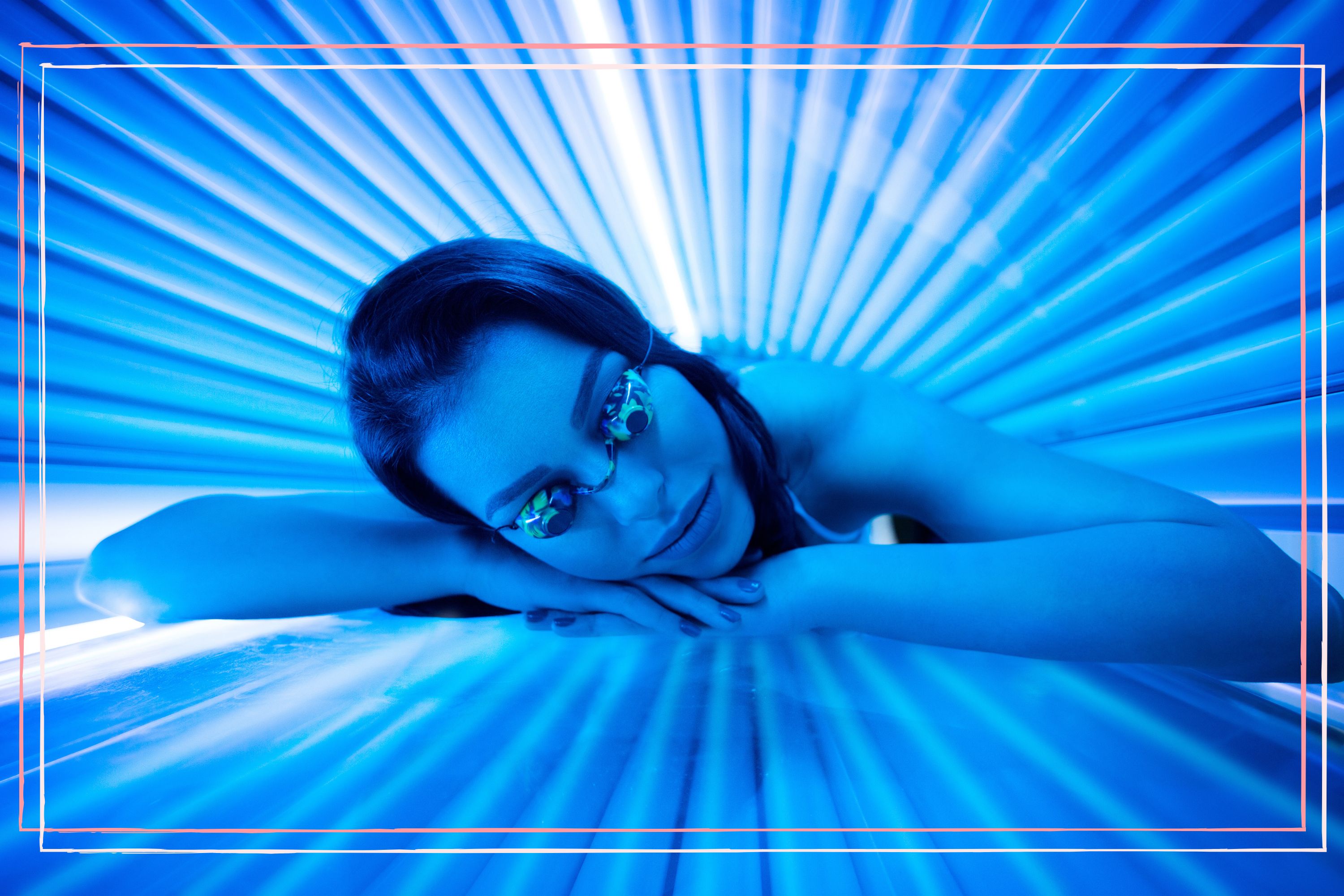Using sunbeds in pregnancy 'is really dangerous' warns skin cancer specialist
We all know sunbeds are bad for you, but using sunbeds in pregnancy is particularly dangerous. Here, a skin cancer specialist explains why.

Parenting advice, hot topics, best buys and family finance tips delivered straight to your inbox.
You are now subscribed
Your newsletter sign-up was successful
Sunbeds are proven to cause skin cancer and using sunbeds in pregnancy is particularly dangerous, but as searches for ‘Are sunbeds safe in pregnancy?’ rise online, Dr Ross Perry explains why using sunbeds whilst pregnant is even more dangerous.
According to the World Health Organisation (WHO), the use of sunbeds accounts for about half a million new cancer diagnoses each year and in a publication about artificial tanning devices they state, “Evidence of an association between artificial tanning and risk of skin cancer clearly shows that the risk is highest in those exposed to artificial tanning in early life.”
Despite the known risks and clear links between sunbed use and skin cancer, over a quarter of adults in the UK say they use sunbeds, with new data released by the charity Melanoma Focus showing that 28% of UK adults are using sunbeds.
The research from Melanoma Focus also shows that melanoma skin cancer is on the rise in the UK, and around 100 deaths per year are linked with sunbed use.
Dr Ross Perry, a skin cancer specialist and founder and medical director of Cosmedics, and Dr Sasha Dhoat, a consultant dermatologist at Stratum Dermatology Clinics, spoke to us about the dangers of sunbed use and why it is especially dangerous to use sunbeds in pregnancy.
The dangers of using sunbeds in pregnancy
Sunbeds are not safe for anybody to use as the UV radiation from sunbeds causes skin cancer. Cancer Research UK states, "Sunbeds use high intensity UV radiation for quick tanning. UV radiation can damage the DNA in your skin cells. This can lead to skin cancer, including melanoma, which is the most serious type of skin cancer."
Dr Dhoat explains, "Sunbeds give out ultraviolet rays that increase your risk of developing skin cancer and cause considerable premature ageing of the skin. The UVA radiation from sun beds is up to three times more intense than the UVA in natural sunlight, in order to achieve rapid tanning."
Parenting advice, hot topics, best buys and family finance tips delivered straight to your inbox.
The risks associated with sunbed use increase when you are pregnant, and you become more likely to burn and more likely to do permanent damage to your skin. Dr Ross Perry explains, "First of all, sunbeds are dangerous whether you are pregnant or not, because they can cause skin cancer and also result in premature ageing. Using sunbeds whilst pregnant is really dangerous as the skin is much more sensitive and therefore you run the risk of burning the skin more easily - and just one sunburn can lead to skin cancer later down the line."
Dr Perry adds that hormone changes during pregnancy can lead to skin pigmentation issues, which can actually become permanent. And while research is limited when it comes to the effects of sunbeds on unborn babies, there is a possible link between increased UV exposure and folic acid deficiency. Dr Perry says, "Particularly in the early days of pregnancy, folic acid is necessary in the development of the baby’s brain and spinal chord and other birth defects, so it’s really not worth taking the risk."
Is it safe to sunbathe while pregnant instead?
Cancer Research UK makes it clear that, "there is no such thing as safe tanning from UV radiation" and this includes both sunbathing and the use of sunbeds.
While using a sunbed can be more harmful than sunbathing outside, this doesn't mean that it's safe to sunbathe while pregnant. For the same reasons it is dangerous to use a sunbed whilst pregnant, you also have a higher risk of burning if you sunbathe when pregnant.
Dr Dhoat explains, "There is no safe 'sunbathing practices' or sun bed use, for any individual, with regards to skin cancer and photoaging. Furthermore, skin can be extra sensitive when you’re expecting a baby and can burn more easily too. UV radiation puts mummies-to-be at risk of blotchy pigmentation disorders, such as chloasma, which may persist after giving birth, as well as dehydration from overheating, which can affect the baby, whether excessive exposure is from natural or artificial sources."
Dr Ross Perry also told us, "Prolonged periods in the sun can also lead to dehydration, which can be really dangerous when you’re pregnant. The skin is also more prone to hyperpigmentation during pregnancy, so although it’s great to get that dose of vitamin D, you shouldn’t be spending longer than 15 minutes in the direct sunlight, especially during the hotter months."
However, Dr Dhoat did tell us that while sunbathing might not be advised, getting fresh air and enjoying natural sunlight safely has benefits: "I am a huge advocate for fresh air and natural daylight, for a myriad of physical and mental health benefits, especially during the often challenging time of pregnancy, as long as this is enjoyed safely and sensibly. Pregnant women can even expose their bellies to natural sunlight, if desired. I would suggest high factor sunblock SPF 45+ UVA 4-5 star rating April to October to sun-exposed areas and when on sunny holidays, investing in long sleeved clothing and a wide-brimmed hat and seeking shade between 11am and 3pm during summer months. With these precautions, pregnant women and their precious silent passengers can reap the natural benefits of sunlight, without the dangers of deeply tanning or turning bright red."
Cancer Research UK suggests, "If you want a tan, using fake tan from a bottle or a spray tan is safer than using a sunbed or sunbathing."
Is it okay to use fake tan while pregnant?
It's generally considered safe to use fake tan creams and lotions during pregnancy. Dr Ross Perry told us, "Using fake tan when pregnant is entirely safe. The main ingredient in fake tan is dihydroxyacetone and this isn’t able to penetrate beyond the outer layer of the skin, and therefore cannot harm an unborn baby."
The NHS states, "It's generally considered safe to use fake tan creams and lotions during pregnancy. But it's probably best to avoid spray tans, because the effects of inhaling the spray are not known."
You should also be aware that while there are no risks to your baby when using fake tan during pregnancy, hormone changes may mean that you develop an allergic reaction to it. Again, this is because your skin may be more sensitive.
The NHS suggests, "If you do use fake tan, always test the product on a small area of skin first, to see if you have a reaction."
The information on GoodTo.com does not constitute medical or other health advice or diagnosis and should not be used as such. Although GoodtoKnow consults a range of experts to create and fact-check content, this information is for general purposes only and does not take the place of medical advice. Always seek the guidance of a qualified health professional or seek urgent medical attention if needed.
Our experts

Dr Ross Perry is a GP with a special interest in dermatology. After qualifying from Guy’s & St Thomas’ Hospital Medical School, he pursued a surgical career that now comprises NHS skin cancer reconstruction and private skin treatments. He is the founder and medical director of Cosmedics Skin Clinics.

Dr Sasha Dhoat is a UK-trained Consultant Dermatologist with over 15 years experience in the field, 11 of which as a substantive NHS Dermatology Consultant and Paediatric Dermatologist. She was initially appointed at The Royal Free Hospital and currently works at the world-renowned Bart’s and The London Hospitals; the second largest paediatric unit in London.
This article was updated on May 13th 2024 to ensure that all information is up to date and reflects current research on the topic.

Ellie is GoodtoKnow’s Family News Editor and covers all the latest trends in the parenting world - from relationship advice and baby names to wellbeing and self-care ideas for busy mums. Ellie is also an NCTJ-qualified journalist and has a distinction in MA Magazine Journalism from Nottingham Trent University and a first-class degree in Journalism from Cardiff University. Previously, Ellie has worked with BBC Good Food, The Big Issue, and the Nottingham Post, as well as freelancing as an arts and entertainment writer alongside her studies. When she’s not got her nose in a book, you’ll probably find Ellie jogging around her local park, indulging in an insta-worthy restaurant, or watching Netflix’s newest true crime documentary.

